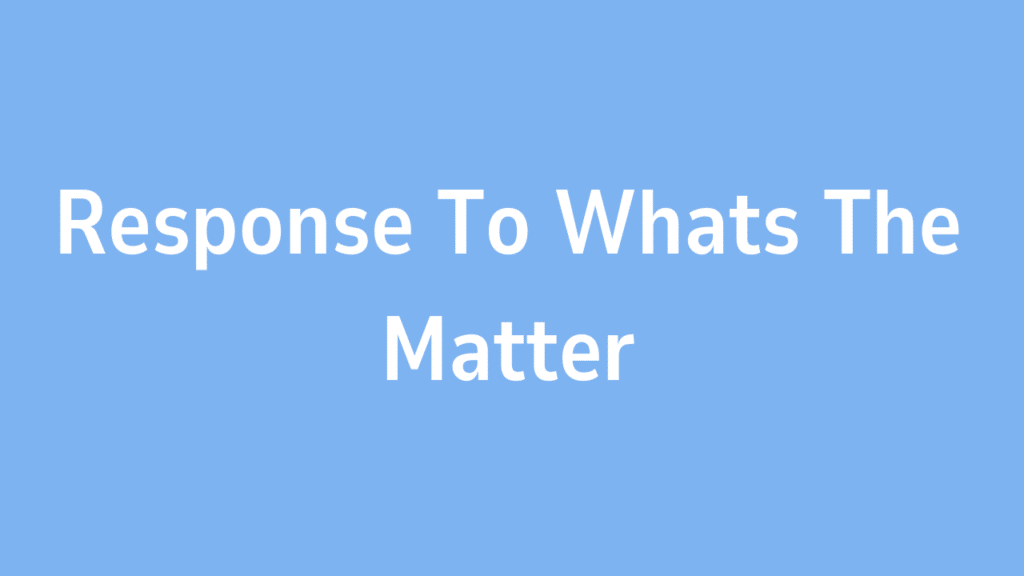Have you ever been asked, “What’s the matter?” when you’re feeling off or stressed? It’s a simple question that can carry a lot of weight, and your answer can shape the course of the conversation. Whether you’re dealing with a personal issue, feeling overwhelmed, or just need some time to process things, how you respond to “What’s the matter?” can vary depending on your mood, the relationship you have with the person asking, and how much you want to share.
In this post, we’ll explore several ways to answer this common question. Whether you’re feeling down, trying to avoid a deep conversation, or looking to lighten the mood with humor, we’ll cover the best responses for every situation.
1. Why Do People Ask “What’s the Matter?”
Before diving into responses, it’s helpful to understand why people ask “What’s the matter?” Here are some common reasons someone might ask:
- Concern: If someone notices you seem off, they may ask this question out of concern, hoping to help.
- Curiosity: Sometimes, people ask simply to understand what’s going on or out of curiosity.
- Empathy: Friends and loved ones may ask because they want to offer emotional support if they sense something isn’t right.
- Casual Check-In: Some people ask this as part of a regular conversation, just to see how you’re doing, even if there’s nothing particularly wrong.
Knowing the intent behind the question can help you decide how to respond appropriately.
2. How to Respond to “What’s the Matter?”
Your answer will depend on several factors:
- Your emotional state: Are you upset? Just tired? Or is it a minor issue you don’t mind discussing?
- Your relationship with the person: Are they a close friend, a co-worker, or an acquaintance?
- Your comfort level: Do you feel like opening up or would you rather keep things light?
Let’s break it down into different scenarios with sample responses for each.
2.1 When You’re Feeling Stressed or Upset
When you’re feeling stressed, upset, or anxious, it’s important to respond in a way that acknowledges your emotions without necessarily going into too much detail. Here are a few responses to consider:
- “I’ve been feeling a bit overwhelmed recently. Just trying to get everything together.”
- This response acknowledges that you’re going through a tough time without oversharing too many details.
- “I’ve got a lot on my plate today, so I’m feeling a bit drained.”
- This is a simple way to explain that you’re mentally or physically exhausted.
- “It’s been a stressful week, and I’m just trying to keep up with everything.”
- This answer is relatable for anyone who’s had a busy, challenging week and might not want to get too specific.
- “I’m dealing with some personal stuff, but I’ll be okay.”
- This lets the person know there’s something on your mind, but you’re not quite ready to talk about it in detail.
- “I’ve been a bit down today, but I’m getting through it.”
- This response acknowledges that you’re not in the best place emotionally but gives the impression that you’re handling it.
These responses convey your emotional state but leave the specifics up to you. They’re helpful when you want to acknowledge that something is wrong but don’t want to go into further detail.
2.2 When You Want to Keep It Light or Avoid Sharing
Sometimes you may not feel like talking about what’s going on, whether it’s because you want to keep things private or don’t feel like discussing your emotions. Here are some lighter, more casual responses:
- “Oh, it’s nothing really. Just one of those days.”
- This response signals that you don’t want to dive into your feelings, and you’re brushing it off lightly.
- “Nothing serious, just a little tired. I’ll be fine.”
- This acknowledges that you’re not at your best, but it’s nothing major.
- “I’m just dealing with a small problem, nothing to worry about.”
- This keeps things vague and nonchalant, signaling that the issue is minor.
- “It’s just a case of the Mondays (or insert any other day of the week).”
- A humorous, casual response that plays off the idea that sometimes we all have tough days.
- “I’m fine, just had a lot on my mind today.”
- A polite way to deflect the question and subtly indicate that you don’t want to go into detail.
These responses are great when you’re not interested in talking about the issue at hand or when you want to maintain a more positive tone in the conversation.
2.3 When You Want to Respond with Humor
Humor is a powerful tool that can diffuse tension and make a potentially awkward moment feel lighter. Here are some humorous responses to “What’s the matter?” that can make both you and the person asking smile:
- “The matter? Well, I’m currently fighting an epic battle with my laundry pile.”
- A lighthearted response that shows there’s nothing major going on, just an everyday challenge.
- “I’m just trying to remember where I put my motivation this morning.”
- A playful response that humorously suggests you’re having a slow day.
- “What’s the matter? Oh, just the usual. Me vs. my Wi-Fi signal!”
- This is a fun, relatable way to make light of everyday frustrations like technical difficulties.
- “I’m just trying to figure out what I did to deserve such a tough day. I’m blaming the coffee.”
- This humorous answer acknowledges that things are a bit rough but in a playful, exaggerated way.
- “Oh, you know, the usual. I’ve been kidnapped by my couch and a blanket.”
- A funny way to express that you’re just tired and want to relax, using humor to make it sound light.
These responses are perfect when you want to keep the mood light and bring a smile to the conversation. Humor is a great way to deflect a serious conversation if you’re not ready to talk about your emotions.
2.4 When You Want to Respond with Empathy or Gratitude
If you sense that the person asking “What’s the matter?” is genuinely concerned about your well-being, you can respond with empathy and gratitude while still addressing the situation. Here are some responses that reflect understanding and appreciation:
- “I really appreciate you asking. It’s just been a tough day, but I’m getting through it.”
- This response acknowledges your situation while also expressing gratitude for the other person’s concern.
- “Thanks for checking in. I’ve been going through a rough patch, but I’m handling it.”
- A response that shows you’re grateful for their support, even if you don’t want to share every detail.
- “It’s been a bit of a challenging week, but I’m staying positive and pushing through.”
- This shows that you’re facing difficulties, but you’re trying to keep a hopeful outlook.
- “I really appreciate your concern. Things aren’t going great right now, but I’m not alone in this.”
- A response that acknowledges both the difficulty of the situation and the support you’re receiving from others.
- “It’s been tough, but knowing you’re there makes it a little easier.”
- This response expresses gratitude while letting the person know that their support helps even in hard times.
These responses show that you’re acknowledging both your feelings and the other person’s willingness to help. They’re great when you want to connect emotionally and express appreciation for the support.
2.5 When You Don’t Want to Answer Directly
In some situations, you may not want to answer the question at all. Whether you’re trying to maintain your privacy, avoid going into too much detail, or simply don’t feel like talking, here are a few ways to politely dodge the question:
- “It’s nothing. Just a little thing, don’t worry about it.”
- A simple, dismissive answer that signals there’s no need to elaborate.
- “I’m just processing some things, but it’s nothing major.”
- This response indicates you’re dealing with something, but it doesn’t require an in-depth discussion.
- “I’m okay, just had a rough start today.”
- A short response that acknowledges the question but doesn’t offer much else.
- “Not much, just trying to figure out life, as usual.”
- A vague and somewhat humorous way to say you’re going through something without going into detail.
- “I’ll be fine, just dealing with a few personal things.”
- A polite way to avoid the question without completely shutting it down.
These responses are useful when you want to maintain your privacy or avoid getting into a deep conversation.
3. Table: Responses to “What’s the Matter?”
| Context | Response |
|---|---|
| Feeling Upset or Stressed | “I’ve been feeling a bit overwhelmed recently. Just trying to get everything together.” |
| Keeping It Light or Avoiding Sharing | “Oh, it’s nothing really. Just one of those days.” |
| Responding with Humor | “The matter? Well, I’m currently fighting an epic battle with my laundry pile.” |
| Showing Gratitude and Empathy | “Thanks for checking in. I’ve been going through a rough patch, but I’m handling it.” |
| Not Wanting to Answer Directly | “I’ll be fine, just dealing with a few personal things.” |
4. Conclusion
The question “What’s the matter?” can be approached in many different ways depending on your emotional state, the situation, and your relationship with the person asking. Whether you’re feeling down, want to deflect, or just want to add humor to lighten the moment, there are various responses available to suit your mood and comfort level.
Ultimately, how you respond depends on the context, your relationship with the person asking, and how much you’re willing to share. Don’t forget: it’s okay to keep things light or personal when necessary. Just be true to how you’re feeling in the moment.



